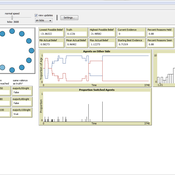
Aaron Bramson
AffiliationsGA technologies, AI Strategy Center, Gent University, General Economics
Personal homepage ORCID more infohttps://orcid.org/0000-0001-8511-3714
GitHub more infoNo associated GitHub account.
Dr. Aaron Bramson is principal investigator of the AI Strategy Center of GA technologies in Tokyo, Japan, as well as an Affiliate Researcher in the Department of General Economics of Ghent University in Belgium. His research specialty is complexity science, especially methodologies for modeling complex systems. Research topics span across disciplines: measures of polarization and diversity, belief measure interoperability, integrating geospatial and network analyses for measuring walkability and neighborhood identification, and myriad applications in artificial intelligence and data visualization. He received his Ph.D. from the University of Michigan in a joint program with the departments of Political Science and Philosophy as well as an M.S. in Mathematics from Northeastern University.
Research Interests
Complex systems, agent-based modeling, social simulation, computational models, network models, network theory, methodology, philosophy of science, ontology, epistemology, ethics, artificial intelligence, big data analysis, geospatial data analysis,
The Epistemic Role of Diversity in Juries
Aaron Bramson Patrick Grim Daniel J Singer Jiin Jung William J. Berger Bennett Holman | Published Wednesday, August 16, 2023This model is linked to the paper “The Epistemic Role of Diversity in Juries: An Agent-Based Model”. There are many version of this model, but the current version focuses on the role of diversity in whether juries reach correct verdicts. Using this agent-based model, we argue that diversity can play at least four importantly different roles in affecting jury verdicts. (1) Where different subgroups have access to different information, equal representation can strengthen epistemic jury success. (2) If one subgroup has access to particularly strong evidence, epistemic success may demand participation by that group. (3) Diversity can also reduce the redundancy of the information on which a jury focuses, which can have a positive impact. (4) Finally, and most surprisingly, we show that limiting communication between diverse groups in juries can favor epistemic success as well.
Under development.
